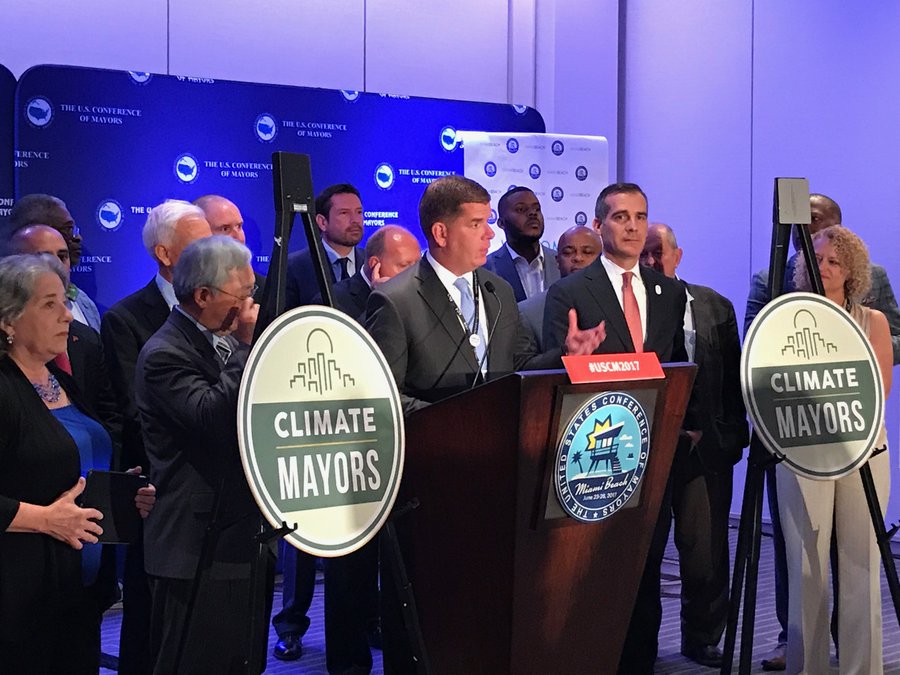 Via @marty_walsh (Mayor Marty Walsh) Twitter
Via @marty_walsh (Mayor Marty Walsh) Twitter
Empowering City Diplomacy is Crucial to Building a Resilient Future
As the Biden administration looks to rebuild America’s presence on the global stage, investing in city diplomacy offers a bottom-up approach that could benefit thousands of Americans and combat global challenges. Cities are poised to become prominent players in global governance through burgeoning city-to-city networks. Empowered by globalization and urbanization trends, cities are economic powerhouses tasked with serving increasingly diverse populations. Around the world, cities generate more than 80% of global GDP and represent a growing majority of the world’s population. Just in the U.S. alone, ten cities contribute almost a third of national GDP. For these cities, providing for their local community means engaging the world as a global actor.
As these urban centers continue to grow, they serve as a local snapshot of today’s most pressing challenges, from intense climate hazards to the current COVID-19 pandemic. Yet at the same time, unencumbered by national politics, cities demonstrate the necessary role of global collaboration in mitigating risks and building resilience through city-to-city diplomacy.
Cities Tackle Global Issues
Unlike leadership on the national level, city leadership sees the direct impact transnational issues have on citizens. As subnational actors, cities can bypass federal partisan politics and international tensions to collaborate with other cities around the world to implement policies that meet the needs of their constituents now, while also preparing for the future. Cities leverage global engagement to benefit their local communities through economic investment, public diplomacy initiatives, private-and-public partnerships, humanitarian action, and information and resource sharing.
The most impressive outcome of city-to-city diplomacy is the increasing global leadership cities are taking on issues where national coordination has been insufficient. City networks allow local leadership to share information, advocate, and make agreements on a variety of issues such as capacity-building and resiliency (100 Resilient Cities), immigration and refugee resettlement (Mayors Migration Council), and anti-extremism (Strong City Network).
Through these networks, cities are leading the way in climate action. Recognizing their outsized energy consumption and emissions, C40 Cities is an international network of megacities committed to meeting the demands of the Paris Agreement. C40 Cities represent more than 700 million people and a quarter of the global economy, making their commitment to action necessary for combatting climate change. In a 2019 report, C40 Cities announced that 53 members peaked or were expected to peak emissions by the end of 2020, and through their collaboration, will prevent at least 1.9 gigatons of greenhouse gas emissions (or five times that of the United Kingdom’s annual emissions) between 2020 and 2030.
In addition, city networks are flexible enough to respond to emerging crises, such as the COVID-19 pandemic. Cities for Global Health launched to improve cities’ cooperation during the crisis and look ahead towards post-pandemic recovery and transformation. Ordinarily partnered for cultural, education, information, and trade exchanges, sister cities have adapted to provide humanitarian assistance and guidance during the pandemic.
Looking Ahead: Empowering City Diplomacy
City networks have proved they are not only willing to come together to collaborate for practical solutions with an eye towards the future, but that they can take definitive action and deliver tangible results. As global challenges impact local needs, city diplomacy offers a path towards a more collaborative and resilient future. As such, the U.S. should empower city networks through capacity building and resource sharing.
Despite their global influence, many cities lack the resources, expertise, and capacity to fully engage in the city diplomacy necessary to benefit their local communities. Only Los Angeles, Atlanta, and New York have created specific offices for conducting city diplomacy and current federal leadership for city and state international engagement is limited in scope. This fragmented approach can be elevated through federal partnerships. Programs should offer municipalities staff training and recruiting, foreign policy guidance, access to expertise, and program funding. Creating a centralized guiding framework for cities and states engaging with international actors, such as through the proposed Office of Subnational Diplomacy within the Department of State, will allow the U.S. to leverage city networks to their full potential.
As the Biden administration looks towards reinvigorating U.S. leadership on the global stage, investing in city diplomacy can improve the U.S. national image and soft power abroad while also bringing the benefits of global partnerships directly to citizens through local initiatives. More importantly, it allows cities to pool experience and knowledge for a grassroots approach to remaining adaptable and resilient in the face of emerging threats.





